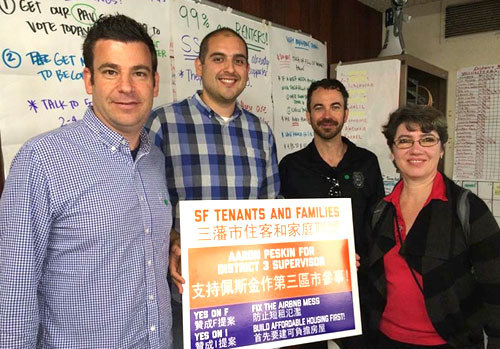For more information on how the “gig economy” hurts workers, click here.
Teamsters 856 stewards who attended the Local’s annual steward appreciation event in late 2015 in San Francisco will remember Aaron Peskin’s address to the crowd. Peskin – who at the time was running for the San Francisco Board of Supervisors – gave an impassioned speech demanding so-called “gig economy” companies like Airbnb and Uber no longer be allowed to bypass the law and undermine good middle-class, union jobs, like the ones Teamsters 856 members working in the hotel industry hold.

(L-R) Teamsters 856 Principal Officer Peter Finn, Vice President Rudy Gonzalez, Rep. Corey Hallman, and Park Central Hotel Steward/Organizer Kathleen Romero advocate for regulations on short-term rentals to protect workers and families in San Francisco in 2015.
Less than two years later, with a worker-friendly supermajority on the San Francisco Board of Supervisors, including Teamsters 856-backed Peskin, Jane Kim, and Ahsha Safai, the city reached a landmark settlement with Airbnb that will make a profound difference to the more than 3,000 Local 856 members who live or work in San Francisco.
Teamsters 856 has long taken a hard stance against “gig economy” companies like Airbnb and Uber that operate in flagrant disregard of laws that protect workers and attempt to distance themselves from users who break the law via their platforms.
“Local 856 members should consider this a huge win,” said Peter Finn, Teamsters 856 Principal Officer. “Through our relentlessness on this issue and our local union backing candidates who don’t just say they stand with working people, but actually take meaningful action, a multi-national company worth billions of dollars couldn’t just throw money at the city and usurp laws that protect working people.”
In the past, short-term rental sites argued that they weren’t responsible for illegal rentals listed on their platforms, giving sites like Airbnb – which is valued at $30 billion – an unfair advantage over legitimate hotels in San Francisco where 1,000 Local 856 members make their living to support themselves and their families. Unlike traditional properties, which are regulated, insured, required to report occupancy rates, and pay taxes, Airbnb had tried to shirk its responsibility to ensure its users also follow the law when using its platform to list rentals.
Short-term rental sites like Airbnb not only hurt workers, but can also have dire consequences for residents by further constricting San Francisco’s already limited housing supply. Landlords are enticed to take long-term residences off the market and turn them into short-term rentals where they can charge steep prices, much of the time in residential areas not zoned for hotel-like businesses. Developers also scoop up properties, evicting long-term residents in rent-controlled apartments, pushing working people out of their homes in order to capitalize on the short-term market. What’s more, these illegal hotels hire non-union housekeeping and maintenance staff who likely don’t have access to livable wages or worker rights afforded to traditional employees. Local 856 members also report these types of rentals are changing the landscape of their communities, with strangers who have no ties or investments to their neighborhoods creating nuisances, and coming and going at all hours of the day.
As part of the agreement with San Francisco, Airbnb will now only accept listings from hosts who have registered with the city. In addition, the company will provide monthly reports of all San Francisco listings to the city so that it can ensure rentals are in compliance with the law, have proper insurance, are up to code, and rightful transient and occupancy taxes can be collected to support municipal services. There is also now a cap on the number of nights short-term listings can be rented in a calendar year.
Local 856 member Kathleen Romero, who worked in the hotel industry for more than 30 years and has advocated on behalf of her fellow Teamsters at the local and state level for strict regulation on short-term rentals, is pleased with the settlement.
“Airbnb and like companies in the city will now have the same oversight that real hotels have,” said Romero. “Traditional properties are regulated, insured, and pay their fair share to support city services. It’s only right that these businesses are properly regulated too so we know who to hold accountable when things go wrong.”
“This achievement is undeniable proof that the candidates we stand with and elect have a direct effect on our families, neighborhoods, wages, and working conditions. We must always remain on offense to protect and advance workers’ rights,” said Finn.

